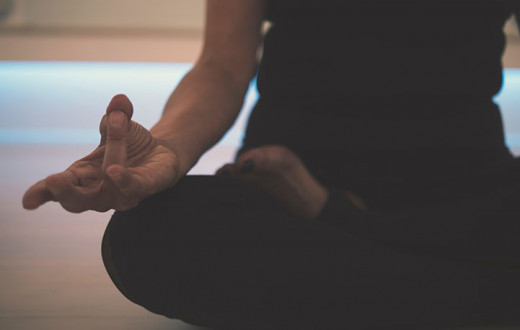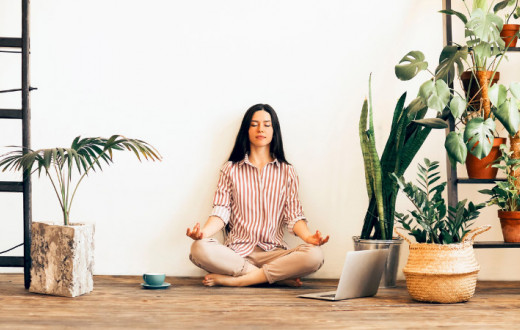By Anuradha Gupta | Posted : October 13, 2020
Up till 1 am, binge-watching shows and browsing social media? The pandemic has taken its toll on sleep and mental health and there even is such a thing as coronasomnia! We spend roughly 1/3 of our lives sleeping; what better time to talk about sleep?!
Sleep deprivation is a public health epidemic. According to the CDC 1/3 of U.S. adults get less than recommended sleep; poor sleep in children and teens can impact mental and physical health right into adulthood. Inadequate sleep is linked with chronic illnesses like type 2 diabetes, obesity, depression, heart disease, chronic inflammation and impact immunity, making us susceptible to infections. How can the 5,000-year-old science of Ayurveda help?
Ayurveda and sleep
Ayurveda factors in three pillars of health, Ahara (Nutrition), Vihar (Balanced lifestyle), and Nidra (Sleep). It’s no wonder that sleep and nutrition are accorded equal importance! According to the root text, Charaka Samhita, ‘happiness, nourishment, strength, virility, knowledge, and life itself depend on proper sleep’.
We all envy that one friend who sleeps in the midst of mayhem! Indeed, everyone has a unique Ayurvedic constitution composed of Doshas (energy principals) that can go out of balance. This impacts our health and sleep; where do you land with the Ayurvedic sorting hat? How do you attend to your health?
Sleep can be physiological, induced by Tamas (lethargy), Kapha, mental or physical exertion, illnesses and stress, improper nutrition, lifestyle, and environmental factors can cause,
Excessive sleep; normally Kapha imbalance
Insomnia, disruptions in quantity or quality of sleep – normally Vata or Pitta imbalance (esp. Vata).
Natural rhythms and sleep
Following natural rhythms is part of Preventive Health in Ayurveda just as modern medicine uses chronobiology. An article on the “Sleep benefits of Ayurvedic medicine” in ‘Psychology Today’ credited Ayurveda with being the first adapter of ‘bio time’ and its relevance in supporting sleep with personalized medicine. Ayurveda recommends optimal practices for Dinacharya (daily), Ritucharya (seasonal) routines, and our life stage. Kapha dominates during childhood (no wonder they say sleep like a baby!) and Vata during old age which explains why it's harder to sleep with age though vital for rejuvenation! The Ayurvedic clock helps align sleep cycles.
Dosha-wise suggestions
Vata: Vata gets easily depleted and needs extra (8-9 hours) sleep (though they may crave less). Their sleep can be light, restless, and dreams, spacy, creative, or abstract! A Vata sleep imbalance involves difficulty sleeping, sleepwalking or talking, grinding teeth, waking early or frequently at Vata time (2 to 6 am), not feeling rested, or feeling anxious. Vata goes out of whack during travel/jet lag. Here are ways to balance Vata. Follow a routine, sleep by 9-9:30 pm and try an Abhyanga (self-massage) with sesame oil if possible daily, a scalp, and Paada Abhyanga (foot massage) before sleeping and wear cozy socks. A comfortable, fluffy bed with a weighted blanket could also help!
Pitta: Pitta needs regular (7-8 hours) of sleep and to relax more. They are light sleepers, can fall back asleep easily if awakened but have difficulty sleeping especially between 10 pm to 2 am Pitta time. They are typical ‘productive’ night owls (but need sleep to affect cellular repair!) An imbalance can make them wake up feeling hot, sweaty, and irritated. Their dreams can be fiery and realistic, with problem-solving! Here are tips on balancing Pitta. Sleep before 10 pm or avoid stimulating activities in the night, stimulants, spicy, rich food, and try aromatherapy with sandalwood. Use coconut oil or ghee for Abhyanga, a foot massage, and application of a few drops on the center of the head before sleeping. Avoid overheating with fewer covers and a firm mattress.
Kapha: Kaphas have deep (non-REM) sleep and need only 6-7 hours though they may crave more! They should sleep after 10 pm and awaken before 6 am. They generally don’t dream, recall their dreams, or dream about the past. Avoid daytime naps that can aggravate metabolic disorders and obesity. An imbalance involves feeling too sleepy, sleeping too long, daytime fatigue, and daytime sleepiness. Here are suggestions to balance Kapha. Try a variety of, and vigorous yoga and exercise, spice up your routine (and diet), try Udwartana (dry massage), or light Abhyanga with olive or mustard oil.
Follow seasonal guidelines based on which dosha dominates during a season. For instance, Spring is Kapha season, a time to sleep less and stay active! These Dosha propensities were confirmed by a recent Psychology Today article on “The Science behind Sleep and Ayurveda”.
Other Ayurvedic Tips:
Routine: A regular routine helps align with natural rhythms.
Nutrition: Have a nutritious diet that balances Agni (digestive and metabolic fire), hydrate enough, and nix caffeine and stimulants after 2 pm. Nutrition includes breath and sensory perceptions; take a breath, set boundaries, and avoid negative news and relationships.
Soothe the senses: Try Dinacharya practices like splashing the eyes, yoga for eye care, and Nasya (oil in the nostrils). Avoid digital overload!
Breathwork: Regular breathwork and Ujjayi breathing before sleeping can promote sound sleep.
Regular Yoga; Try this Yoga routine for alleviating stress and insomnia.
Meditation: The National Sleep Foundation’s recommendations include breathwork and meditation; meditation alleviates stress, promotes sleep, and has myriad scientifically proven benefits. Read our article Guided Sleep Meditation for You: Fall Asleep in Minutes.
Spend time in Nature: A walk at sunrise and sunset resets the biological clock.
Exercise – A study demonstrated that 150 minutes of moderate to vigorous activity in a week improved sleep quality by 65 %! Avoid stimulating exercise in the evening; try a calming yoga sequence instead.
Herbal Formulations: Brahmi, Ashwagandha, Jatamansi, Manasamitra Vatakam, Vacha, and Mandukaparni may be recommended by an Ayurvedic practitioner.
Therapies: Therapeutic Abhyanga, Moordha Thaila (therapies with herbal oil on the scalp like Shirodhara), Sneha Nasya, and Marma are effective sleep aids.
Daytime naps: After a meal, a walk and resting on the left (Vamakukshi) aids digestion. Kapha can avoid daytime naps but they are ok for people habituated to them (summer siestas!), the emaciated, sick, elderly, infants; after trauma, a journey, and people doing strenuous or nighttime work
Nighttime Routine
- Sleep with the setting sun and awaken with the rising sun. (If this is not practical create a setting with dark light and white noise to simulate nighttime).
- Have dinner early (2-3 hours before sleeping) and try Turmeric or Ashwagandha Milk. Don’t eat past 7 pm. Avoid late nights and late-night snacking.
- Keep your bedroom uncluttered, clean, and comfortable. Wear loose, comfortable pajamas.
- Avoid stimulating activity; try a relaxing shower, foot massage, gratitude journaling, self-reflection, white noise, soothing books, and...calming breathwork…
- Unplug: Avoid devices and blue light after 8:30-9 pm that can disturb natural rhythms. EMF disrupts melatonin production; keep phones away or on airplane mode and wifi routers far away or turned off.
- Wake early to feel rested and alert, when Sattva (the truthful, clear quality of the mind) dominates (at Brahma Muhurt; about 1.5 hours before sunrise).
- Sleep position: Generally, Ayurveda recommends sleeping on the left side; physiologically this aids digestion and lymphatic drainage. Bothered by a million thoughts? Try sleeping on your right (left nostrils open corresponding with the cooling energy channel, Ida Nadi).
- Sleep Direction: South-North (head towards south) and East-West are ideal (read details here). Avoid sleeping with your head towards the west or north.
Try Ashwagandha Milk!
Ingredients:
1 cup cow’s milk (ideal adjuvant)
½ tsp Ashwagandha powder
1/8 tsp each nutmeg, cinnamon, dry ginger, cardamom
Method:
Boil the milk
Stir in powders, and mix well. Let it simmer for a couple of minutes.
Sweeten with maple syrup, turbinado sugar, or honey (when lukewarm).
Enjoy your cuppa comfort!
Ashwagandha can aggravate Pitta (cow’s milk soothes Pitta, else substitute Ashwagandha with Shatavari).
Interestingly, we can live without food longer than without sleep; we need our beauty zzz’s to bolster our immunity! Meditation is a great stress-buster and a powerful sleep aid. I invite you to a free breath and meditation workshop.
Disclaimer: This content on the Art of Living Blog is not intended to be a substitute for professional medical advice, diagnosis, or treatment. Always seek the advice of your physician or other qualified health providers with any questions you may have regarding a medical condition, Any links to third-party websites are provided as a convenience only and the Art of Living Blog is not responsible for their content.
Anuradha Gupta is an Engineer, MBA, writer and Ayurvedic Wellness Practitioner. She has a corporate background and volunteers for Art of Living and other nonprofits. You can find her on Facebook or LinkedIn.





























